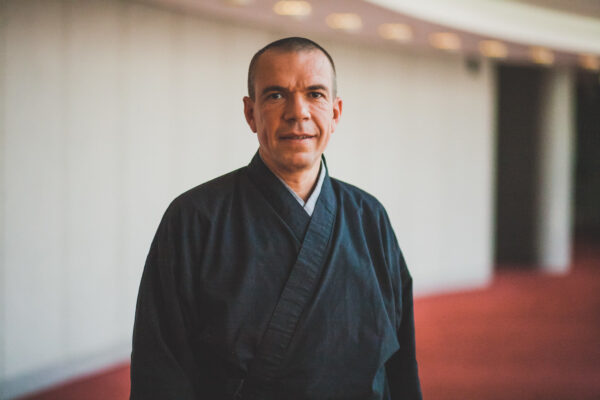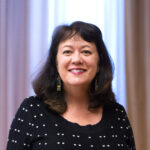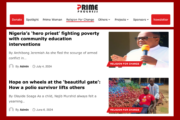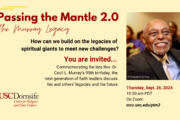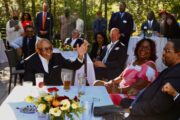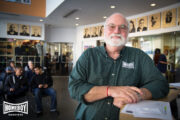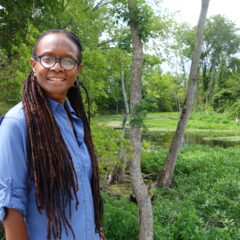This article was originally published by Religion Unplugged, with the support of CRCC’s global project on engaged spirituality.
LALOBBE, France — Bart Weetjens wants to save the world by teaching meditation to one entrepreneur at a time.
So he has gathered five middle-aged men to this farmhouse in rural France, just over the border with Belgium, where they all live. One is the head of a university think tank, one a hospital executive, another runs his own business invoicing company and another is a human resources consultant. All sit on cushions, legs crossed, on the bare wooden floor.
They have just finished sitting in silence for 20 minutes, the soft susurrations of their deep breathing the only sound. Now they create a circle to share thoughts that bubbled up in the incense-ringed silence.
The invoicer’s business is going well; he is rich. But he is also poor. “I have no one to connect with,” he says. “I am missing something, I think.” The others nod in sympathy and the invoicer tears up.
The hospital executive speaks of his long-time girlfriend who recently left him. He has considered suicide. “I made a big mistake,” he shares and weeps.
Weetjens, in a soft black Japanese robe, listens respectfully, nods and helps where he can. Try to find connections by giving of yourself to others, not expecting them to give to you. It is natural to grieve the end of a relationship and acknowledge our faults. The trick is to take those experiences and turn them into lessons of compassion, both for ourselves and for others.
“Don’t do bad,” Weetjens concludes. “Do good. Do good for everybody. Do good everyday.”
It is, perhaps, the ultimate in trickle-down economics — train CEOs to connect with something in the universe bigger than the bottom line in the belief that will make them better and happier human beings who will create happier, more compassionate employees, too.
But Weetjens has his eye on more than the suits. His real target is social entrepreneurs — those self-sacrificing sorts who spend their considerable talents and energies battling global ills like poverty, disease, violence and other human-made blights, often at the cost of their own mental and physical health.
Improve their inner wellbeing and their “well-doing” will improve, too. And, the hope goes, so will the world.
“As a social entrepreneur you are not only expected to be passionate, you are expected to be obsessed,” he says in English marked by the gentle lilt of his native Belgium. “And because obsession really is more of a psychiatric syndrome than it is a healthy space to be in, this is actually leading to a life as a roller coaster with ups and downs and often resulting in anger, in depression, in burnout.”
Weetjens knows this well. In 1995, he co-founded Apopo, a non-profit organization that eradicates landmines in places like Mozambique, Cambodia and Vietnam. He spent the next 20 years traveling the world building partnerships, raising money and collecting awards and accolades, jetting to Davos and giving TED Talks.
In 2015, he stepped down. Though he is immensely proud of Apopo’s achievement and remains on its board, in talks he gives to budding social entrepreneurs, he often says he put an enormous pressure on himself and his team.
“The expectations from the donors were high and we all wanted to succeed,” he says. “That journey often felt like a struggle, like a fight. It was more war to me than it was peace building.”
So how can we save other entrepreneurs, social and commercial, from that kind of war? And how did a Catholic, military school cadet who studied industrial product design in art school end up as a black-robed Buddhist monk with a global audience and a visionary retreat center for social entrepreneurs?
The answer begins with a rodent. A lot of rodents.
It all started with a hamster
Weetjens’ childhood was less than storybook. Affection was scarce, abuse was not. So when he got a hamster for his ninth birthday, he glommed on to its furry softness.
“Having that animal was a great way to project my own affection, to receive affection,” he said. Soon, “Goldie” the hamster went everywhere with him, curling up in his armpit under his shirt.
When he got a second hamster, the pair made a lot of little hamsters. Soon, Weetjens made a business of selling hamsters to local pet stores. He then moved on to breeding gerbils and rats in his room for the next five years.
Rats quickly became a theme in Weetjens’ life. He was fascinated by them, read about them in science journals and biology books. But when he won a slot at one of Belgium’s top-notch military boarding schools, he had to give up breeding them.
Military school brought another theme to the fore of Weetjens’ life — an abhorence of war, violence and injustice. He applied only because his father said he would never be accepted, and only stayed because it was a respite from home. He left after one year.
“There was so much unfairness at the school,” he said, along with hazing and bullying. “It just turned me into the biggest pacifist.”
He attended the University of Antwerp — the city he still calls home — and majored in product design. Like a lot of kids from strict and abusive backgrounds, Weetjens did not know how to manage the sudden freedom of college life. The bohemian, anything-goes atmosphere of Antwerp’s college scene was a taboo-free playground and soon he was sampling all kinds of drugs.
“Basically I escaped into a whole illusionary world, experimenting with boundaries because I didn’t have healthy boundaries myself,” he said. “I mean, the boundaries I had were like restraints. They were not really lived boundaries. There was no real rationale for them.”
The summer he was 21, he and some friends went to Spain for the beaches and the drugs — heroin, cocaine, marijuana and LSD. He barely remembers the trip. On the way home, concerned that border police would find the last of their stash, Weetjens swallowed all that remained of their LSD, about 10 doses.
Somehow, his friends got the wildly-hallucinating Weetjens back to Antwerp. The beach trip ended, but Weetjens’ LSD trip did not, and after days of under the influence of the drugs, he ended up in a psychiatric ward.
“That was a tough time because I thought, ‘Okay, I’m mad, I’m out of my mind,’” he said. “They had to get, like, five nurses to catch me and sedate me.”
Weetjens spent six weeks in isolation and began what would be a years-long regimen of anti-psychotic drugs. Doctors told him it was unlikely he would ever come back from such an intense trip, that it had probably reordered his neurotransmitters beyond repair.
“In the end, it took me 10 years,” he said. “Because of all that care and all of that support, I was able to gradually [taper] off over time. My mind and my body got reunified.”
But what really brought him back was a chance encounter. Weetjens was shopping at the grocery store when he saw a flyer on the store’s bulletin board.
“On top it said ‘Zazen,’ the practice of Zen, and a telephone number,” he remembered. “There was nothing more than that. But since I was in a very terrible state of mind, I took the number and when I came home I called. There was a lady at the other side of the phone, and she explained there is a Zen dojo near, in the south of Antwerp. The next morning, at eight o’clock, I was sitting on a pillow in her dojo, and I felt like, ‘Wow, this is it.’ It felt like coming home.”
Weetjens started a daily Zen practice, with lots of sitting meditation and its goal of stilling of the mind. Just as he had fallen deeply into the comfort of his pet rats and hamsters, he plunged into the accepting well of Zen.
“There was something in me that felt like this can help me,” he said. “And because it was non-dogmatic it was so different than the Catholicism I was brought up with. There were many aspects of Zen that I found attractive.”
When Weetjens started studying with a Zen master who is still his teacher, he felt the final piece of his recovery fall into place.
“There is indeed a therapeutic role for Zen teachers,” he said. “My ego was completely scattered. So I needed to build up my ego, and therefore my master was really careful with me, because he’s also a psychologist. And probably because of that fact, I’ve felt more attracted to Zen because I didn’t feel like he had another agenda apart from me feeling well.”
Twelve years after he walked into his first dojo, Weetjens became a Zen Buddhist priest and master himself.
“What I see in Bart is that his spirituality informs everything that he does,” said Nancy Mortifee of the Well-Being Project, where Weetjens leads a project on awareness. “That doesn’t mean he hasn’t made mistakes in his life — not in my judgment, but in his judgment. The difference is he consistently refers back to his Zen practice and the commitment he’s made to that. And I think it gives him an advantage in the sense that he brings both his personal journey and his spiritual journey to the table of his life. His life is really a marriage of the two.”
A creative approach to finding landmines
Immediately upon his release from the psych ward, Weetjens returned to school and the study of product design. He also traveled to village in Zaire where his uncle was working with Jesuits on engineering projects designed to improve the local residents’ lives.
It was a trip that, when combined with his study of Buddhism, would change the focus of his life.
“I was seeing environmental devastation,” he said. “I was seeing exuberant consumerism and the inequality it created in the world. I was seeing a lot of poverty.”
When he returned to Antwerp, he spent a year designing and building a soy bean thresher from an oil drum and bamboo sticks. The whole thing required only a single screw. Congo got the thresher and Weetjens got his master’s degree in product design.
After graduation, Weetjens went to work designing coaches for a major public transportation company. But it was a bad fit and he left after a year. Then he drifted, living off public assistance in a derelict part of Antwerp. He spent about five years like this, just studying Buddhism and painting. In 1995, he had enough paintings for a solo show in a local church-turned-gallery.
One of Weetjens’ university professors, Mic Billet, came to the show. Billet politely looked at the paintings and invited his former student to lunch. “Bart, you will never become a successful painter,” Billet told Weetjens.
“I was shocked,” Weetjens recalled with a laugh. “Say what? I’ve been working for four years on this exhibition. Come on!”
Billet, a legendary figure at Antwerp University for founding its product development institute, prodded Weetjens to use his exceptional skills as a product designer to pursue his dreams. And he asked the floundering younger man what real-world problem kept him awake at night.
“And I said land mines,” Weetjens said. “I had just seen a documentary on landmines and it just came out of the blue — landmines.”
With two other University of Antwerp professors, Weetjens and Billet founded Apopo, a Flemish acronym for Anti-Persoonsmijnen Ontmijnende Product Ontwikkeling, or “Anti-Personnel Landmines Removal Product Development.” Billet got Weetjens to spend half his time painting and half his time thinking about land mine eradication. In turn, Billet agreed to unearth funds to send Weetjens to landmine conferences around the world.
“And that’s what he did,” Weetjens said. “He supported me.”
In 1995, at one of those conferences in Edinburgh, Weetjens and another attendee were hanging out in a bar, talking about how robotics, radar and computer sensors were all great, high-tech means of finding landmines. But Africa, they thought, would require more practical, low-tech solutions.
They were digging through a stack of landmine research they brought to the bar with them — this was a very geeky conference — when Weetjens opened a paper by two American researchers who trained gerbils to detect explosives.
“It’s weird with these type of things,” Weetjens said. “I remember exactly the place, the setting, the whiskey, the bar counter. I remember exactly every detail of that evening. For me it was suddenly clear — I’m going to train rats to detect land mines.”
About a year later, in 1997, Apopo began breeding African Giant Pouched Rats and training them to sniff out explosives. Called “Hero Rats” by Apopo, they have one of the most sensitive noses in the animal kingdom. Within in a decade of their adoption by Apopo, they successfully identified live land mines in Mozambique, planted during that country’s decade-long series of civil wars, and have since cleared hundreds of thousands of landmines in Cambodia, Thailand, Angola, Laos and Vietnam.
And, to date, they have never lost a rat in the line of duty.
Learning how to prevent burn out
Valeria Merino met Weetjens in 2008 when she came to Africa to see Apopo’s work firsthand for the Ashoka Foundation, where Weetjens was then a fellow and she was a project manager. She was impressed with the rats, but made a real connection with Weetjens over a bottle of wine in an outdoor restaurant. The pair commiserated over the toll social entrepreneurship takes.
“Bart is so genuine,” Merino, now the founder of Systems Entrepreneurs Advisors, said recently. “He has managed to deal with all the recognition and the hardships without it changing him. It is because of his religion. Buddhism is about negating all of those pressures, about being humble, about not centering yourself on possessions. Bart has managed to be true to his ideals . . . and it is difficult.”
With the landmine program underway, Weetjens and Apopo put the rats to work detecting tuberculosis in sputum samples across Africa. More than 2.5 million Africans contract TB annually, according to the World Health Organization. Their rats increase TB detection rates by 40%, Apopo claims.
That kind of success attracted a lot of attention from the upper realms of the world of social entrepreneurs. Apopo, with Weetjens at its helm, received awards, support and money from the World Bank, Ashoka, The Shwab Foundation and The Skoll Foundation, among others. Weetjens found himself going to Davos, Switzerland for the World Economic Forum and giving a TED Talk. He bounced from Tanzania, where Apopo was headquartered, to Europe, Southeast Asia, the Middle East, the U.S. and beyond.
Meanwhile, he got married and started a family — he has two daughters and his wife is a nurse. And he started to burn out.
In 2015 — the year Mozambique declared itself mine-free — Weetjens stepped back from Apopo as one of the most successful and lauded social entrepreneurs of his generation. He has since devoted himself to the practice of Zen Buddhism and how it can assist those who want to do good to keep from burning out.
How Buddhism can help social innovation
In a row house tucked behind a busy Antwerp street, in a third-floor room that is part office, part studio, Weetjens dons a samue, a charcoal grey bathrobe-like garment that is the daily work costume of Buddhist monks. He sits cross-legged on the bare wooden floor and logs on to a computer positioned just so in front of him. The computer’s camera is on.
Around the world, a dozen or more professionals from the non-profit realm turn on their computers and link in. Suddenly, Antwerp is connected to Senegal, Italy, Hungary and the U.S. It is Tuesday at 3 p.m., time for Weetjens’ weekly meditation for social entrepreneurs.
“I want to speak about the downside of social entrepreneurship and the lack of personal sustainability,” Weetjens says after leading a silent meditation punctuated by resonant strokes on a small gong. “I’ll speak from my own perspective, how I experienced this 20-year rollercoaster at Apopo . . . Even if we had the most peaceful intentions, that journey often felt like a struggle, like a fight. It was more war to me than it was peace building.”
Social innovation — the work of social entrepreneurs — requires an almost superhuman commitment and performance from its creators, with comparatively little financial compensation. Social entrepreneurs are expected to give all of themselves, to be obsessed with their field and work. And that, of course, can lead to bad behavior, bad decision-making, a volatile work environment and all-around burnout.
The few studies there are on social entrepreneurs bear this out. A 2010 study of 10,000 non-profit professionals found that 90% pinpointed burnout as the primary reason they did or would leave the field. Another study of NGO employees found that 42% believed the job was “detrimental to their mental health.”
So the Ashoka Foundation began a series of conversations among its many fellows, including Weetjens, about their emotional health and the personal costs of their careers. They found most of the fellows came to their work through some sort of personal trauma — that past experience with poverty, hunger, violence or war often led to work in those areas. But when trauma is at the root of something — even good works — it will eventually rise to the surface.
“These leaders don’t learn healthy ways to deal with trauma,” Weetjens continued. “Most of them over identified with their work and they completely forgot about themselves. Very often there was a culture of sacrifice and martyrdom around these social innovation leaders.”
Out of those initial conversations, Ashoka and about a half-dozen other social innovation non-profits established The Wellbeing Project, now one of Weetjen’s main areas of focus. His weekly meditation is one of many resources the project offers social entrepreneurs, with webinars, mentoring, and physical and mental health services. About 100 people have participated in the program so far.
The goal is nothing short of culture shift, Weetjens said. Away with the overwhelming personal sacrifice, emotional depletion and unexamined trauma and in with balance, effectiveness and higher quality of both work and life. And the secret sauce, he continued, is simple and found in all of the world’s religions, especially his own adopted Buddhist practice — compassion, both for one’s self and for others.
“It is all about exploration,” Weetjens tells the virtual gathering. “It’s about allowing ourselves to be open to our own vulnerability, to take off our masks and face that the problems that are in society are actually a reflection of the problems we carry inside. A path to inner wellbeing may be the most effective approach to solve the world’s most pressing social and environmental challenges.”
A pitch for entrepreneurs
A day after his weekly Ashoka meditation, Weetjens packs his car and heads south. He is headed to La Grande Terre, an 18th century farm-turned-factory-turned-permaculture center in the French Ardennes where he holds Zen Buddhist wellbeing retreats for social and corporate entrepreneurs.
During the drive, Weetjens unspools his plans for La Grande Terre, which includes a conference center, healing workshops, therapeutic retreats and classes. He envisions refurbishing its fieldstone outbuildings, which spool out from a small farmhouse across green fields, cow and sheep pastures and a stream with an old mill and waterfall.
“That will take many years, of course,” and about four million Euros which he does not yet have, he said. Weetjens takes no salary for shepherding La Grande Terre. “But I tend to think from a place of abundance.”
For now, La Grande Terre’s functioning space is a two-story farmhouse with a Dutch door and bedrooms and common spaces big enough to sleep and feed about six people on retreat. The living room is now a meditation dojo, with a small altar that holds a miniature clay Buddha, molded by Weetjens’ youngest daughter, and an orange gerbera daisy.
After three days of sitting meditation five times a day, as many circle talks and some bountiful vegetarian meals and a whole lot of French pastries and coffees, the entrepreneurs embrace Weetjens, schedule more meditations and times to talk with him and drive their various cars back to Belgium.
“People are just so . . . we are just racing thru life,” said Sabine Denis, the director of SPES who was bustling behind the scenes during the retreat. Denis took time between answering phone calls and making runs for French pastries to sit on the floor for Weetjens’ guided mediations where she witnessed some of the transformations the entrepreneurs made — transformations she attributes to Weetjens.
“People wouldn’t come all the way to La Grande Terre if it weren’t for this thing that not many people have,” she said. “The fact that he is an entrepreneur means he can talk their language. He actually gets through to them and is not invasive or threatening. He guides them by the hand.”
Later that day — after cleaning the kitchen and closing up the farmhouse — Weetjens loads his car to head home.
It has been a good weekend, he says on the two-hour drive back to Antwerp. The corporate entrepreneurs seemed to grasp the idea that their own internal wellbeing would lead to external wellbeing for their employees and their companies. He is especially encouraged by the progress of the man who shared he made mistakes in his most intimate personal relationships.
“Isn’t it marvelous,” Weetjens says, darting around a slow-moving car — for a Buddhist priest he is a bit of an aggressive driver. “In my eyes, this is simply miraculous that the guy who has a very hardcore financial business notices his own arrogance and that he’s ready to work on that.”
“That’s where the transformation is,” he continues. “Because if he does work on that, then all the hardness that is there in his company is transformed into something else.”
At different points in the weekend, all of the men at the retreat seemed to land at the same realization, that whatever they were missing in their lives — emotional intimacy, meaningful work, purposeful direction — had a common remedy: compassion for themselves and for others.
“We show up as we are with our whole backpack of pain and suffering and everything that is unprocessed,” Weetjens says about this thought. “Our trauma is continuously propelled forward unconsciously and that’s why an authentic search for truth is so important. It opens our eyes and opens us up to true love.”
“Simply by becoming aware, well, we plant the seeds of transformation.”
Read the article on religionunplugged.com.
Kimberly Winston is a journalist fellow with the Spiritual Exemplars Project.
